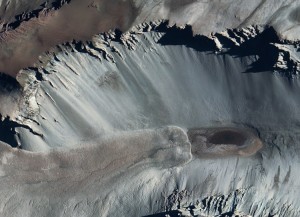Don Juan’s Salty Waters
Friday, August 19th, 2016August 19, 2016
In Victoria Land on the Antarctic coast, there lies a small body of water so salty that it is almost impossible to freeze—even in the coldest place on Earth! Don Juan Pond, which lies in the cold continent’s Wright Valley near the Ross Sea, is so salty that temperatures must plummet to -127 °F (-53 °C) to freeze it—far colder than the area’s average temperature and far colder still than the 32 °F (0 °C) needed to freeze pure water. (Salt lowers the melting point of ice, which is why it is spread on icy roads and walks in winter). The small pond—it covers roughly 7½ acres (3 hectares) with an average depth of just 4 inches (10 centimeters)—is 44 percent saline, making it the saltiest natural body of water on Earth. By comparison, the famous Dead Sea in southwestern Asia is about 33 percent saline, and the second saltiest body of water, Lake Vanda (a larger, deeper neighbor of Don Juan), is 35 percent saline.

The extreme landscape around Antarctica’s Don Juan Pond (the black pool in the right of the photograph) resembles a lunar or Martian scene more than a glimpse of our own planet Earth. Credit: NASA/Goddard Space Flight Center Scientific Visualization Studio/Landsat 7 Project Science Office/MODIS Rapid Response Team
Don Juan Pond was not named after the Spanish legendary figure, but rather for the United States Navy helicopter pilots who discovered it: Lieutenants Donald Roe and John Hickey—Don Juan (John). The Navy pilots first saw the pond on Oct. 11, 1961, during a reconnaissance flight through the McMurdo Dry Valleys—an area called “dry” because it is free of snow and ice, a rare thing in Antarctica. Glaciers carved the valleys long ago, and snow that falls there is swept away by winds. The valleys have only trace amounts of snow or ice melt or groundwater. Consequently, researchers believe that the brine of Don Juan Pond comes from salt deliquescence, a process by which the salt melts or becomes liquid by absorbing moisture from the air.
On that cold October day in 1961, the pond was liquid despite the −22 °F (−30 °C) temperature. Continued studies by the U.S. Antarctic Program found a new mineral at the pond, calcium chloride hexahydrate (sometimes called Antarcticite), as well as vast amounts of sodium chloride (ordinary table salt). Remarkably, researchers also identified species of algae, fungi, and heterotrophic (parasitic) bacteria living in the harsh brine of Don Juan Pond. Later studies found the pond (which varies in size but has shrunk considerably since the 1960′s) devoid of such extremophile life, but high levels of nitrous oxide around the lake may indicate continued microbial activity. Regardless, the possibility of life in Don Juan Pond—as well as the pond’s very existence—fuels speculation for the existence of water and life in another extreme environment, the surface of our planetary neighbor Mars.


